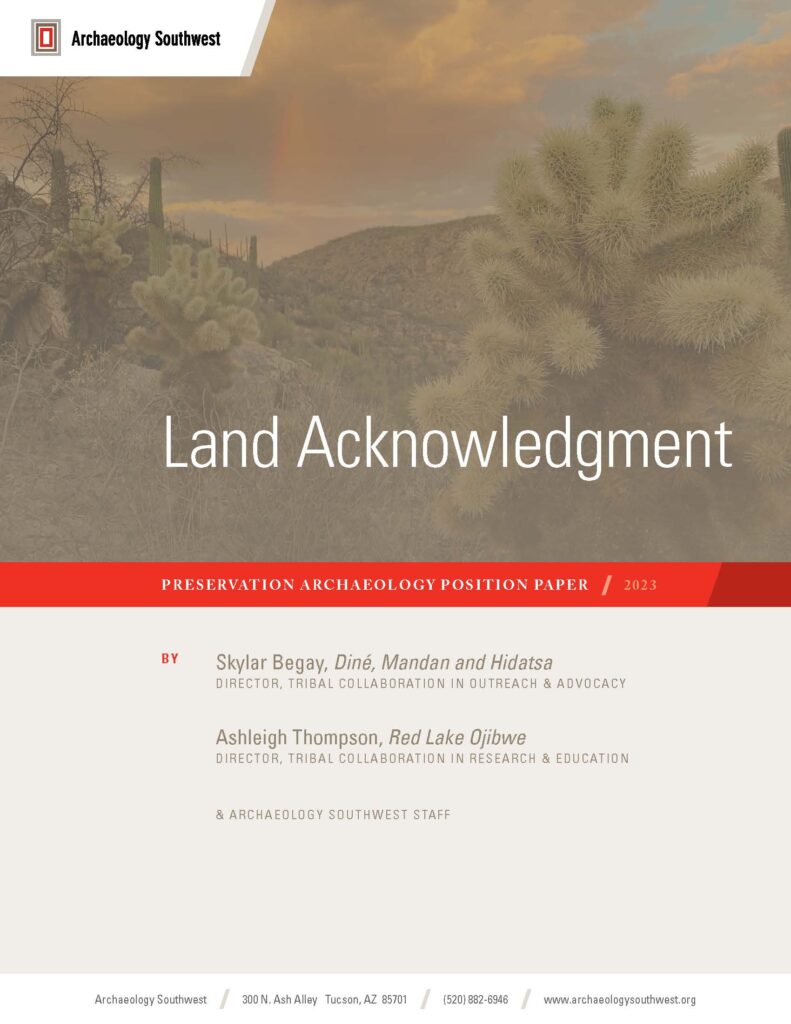Skylar Begay, Director, Tribal Collaboration in Outreach and Advocacy
Ashleigh Thompson, Director, Tribal Collaboration in Research and Education
with Archaeology Southwest staff
Archaeology Southwest is a private 501(c)3 nonprofit organization headquartered in Tucson, Arizona, on the homelands of the Tohono O’odham Nation and the lands of the Pascua Yaqui Tribe.

Although our offices are in Tucson, our work takes place across the present-day “American Southwest.” Nearly 100 federally recognized Tribes exercise and advance their inherent sovereignty in our area of interest. In addition to federally recognized Tribes, the region is also home to Tribes and Indigenous communities that the government does not formally acknowledge. Some of these communities have Territories that extend into Mexico, and New Mexico is home to many people of Genízaro descent, made up of multiple Indigenous ancestries.
In short, the entirety of the American Southwest, and all of the Americas, comprises the homelands of Indigenous Peoples—as it has for millennia.
Indigenous Peoples have stewarded their Territories since time immemorial. Their vibrant and diverse history remains visible today. Ancestral belongings, structures still standing, pictographs and petroglyphs, hydrological engineering feats such as extensive irrigation canal networks and agricultural field systems, and many other features, tools, and items made by Indigenous Peoples are found across the Southwest. Archaeological sites such as these—and the cultural landscapes of which they are a part—attest to the depth and richness of Indigenous cultural legacies.
Archaeology has a history of disrespecting Indigenous Peoples’ inherent rights over their heritage sites, belongings, and Ancestors. Archaeologists have not always asked permission nor collaborated with Tribal Nations to study and interpret their heritage places and belongings. This lack of consultation has led not only to the removal of Ancestors from their resting places, but also to the displacement and culturally offensive treatment of countless places and cultural items. Today, Tribes endure long, difficult processes to have these items and Ancestors returned home.
Some archaeology has also been at odds with Indigenous teachings and knowledge handed down by generations of Indigenous Peoples whose values often forbid or discourage the disturbing of ancestral homes and gravesites or the handling of ancestral belongings. In practicing Preservation Archaeology, we acknowledge this truth. We recognize the moral imperative to halt these wrongdoings by supporting and collaborating with Tribal member-citizens, communities, and Nations. Through inclusion of Indigenous people in our efforts, enhanced Tribal collaboration, and advocacy, we work to continue reforms within archaeology and to ensure Preservation Archaeology contributes to healing from past and ongoing wounds.
Although European colonization is a relatively recent occurrence in the deep history of the Americas, it forever altered life for Indigenous Peoples. Across the continent, genocide, land dispossession, forced relocation, assimilation, and colonization decimated Indigenous communities and the size and integrity of Indigenous Territories. Despite this dark history, Indigenous Peoples continue to thrive and to heal from the continuing traumas of colonization.
Because all Indigenous Peoples have been physically removed from at least part of their homelands, and have been otherwise jurisdictionally excluded, they have scant opportunity to influence the management of public and private lands across their Territories. Nevertheless, they maintain connections to the entirety of the American continents and have inherent rights to participate in legal and other decisions affecting these lands.
Consequently, Archaeology Southwest affirms that the “American Southwest,” as well as all lands of the “Americas,” have been the homelands of Indigenous Peoples since time immemorial, and that they remain so today. We recognize that archaeology has contributed significantly to the historic and ongoing injustices committed against Indigenous Peoples. We respect their inherent rights and authority in the study of their Ancestors’ legacy and their inherent right to manage and steward the lands on which this legacy is built.
Furthermore, we commit to avoiding perpetuation of these injustices. We aim to support conservation and protection efforts led by Tribes, and to commit to greater inclusion, consultation, and collaboration with Tribal members, communities, and Nations.
Abridged Version
Archaeology Southwest is a nonprofit preservation and research organization headquartered in Tucson, Arizona, on the homelands of the Tohono O’odham Nation and the lands of the Pascua Yaqui Tribe.
Archaeology Southwest acknowledges that the present day “American Southwest,” and all lands of the “Americas,” have been the homelands of Indigenous Peoples since time immemorial and remain so today. We recognize that non-Indigenous archaeology and conservation communities have contributed significantly to historical and ongoing injustices to the detriment of Indigenous Peoples.
Archaeology Southwest seeks to halt these injustices. We respect the rights and responsibilities of Indigenous Peoples to manage and steward their lands and legacies. We support preservation efforts led by Tribes, and commit to ever-greater inclusion, consultation, and collaboration with Tribal members, communities, and Nations in the study and conservation of their Ancestors’ legacies.